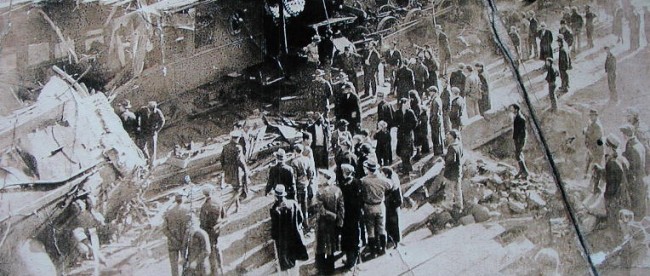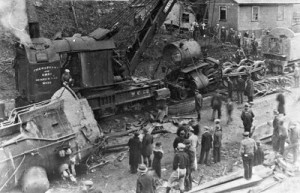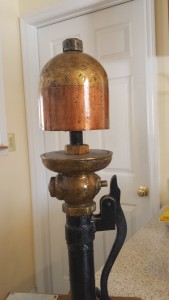Steam Whistle from 1934 Boiler Explosion

Own this historical whistle, $1000.00
Locomotive Boiler Explosion at McDunn
Beckley Post-Herald
December 28, 1934
Sixteen Dead as Engine Of Mine Train Explodes
Others May Die
Boiler Of Locomotive Is Hurled Through Car Carrying Men To Fayette Mine
Explosion Occurs As Train Reaches McDunn
Victims Employes of Koppers Operation On Armstrong Creek
By Hamilton Faron
Associated Press Staff Writer
POWELLTON, Dec. 27 – (AP) – Mauled and torn beneath a locomotive boiler that hurtled high into the air after an explosion, 16 men are dead and 43 others in a hospital tonight – eight likely to die.
The huge boiler flew into the mist-filled air without warning as the men rode a work train to their jobs in the mountain top mine of the Elkhorn-Piney Coal company.
“It was a terrible noise – then the men screaming, crying and shouting,” said Mrs. Earl Morris whose house beside the tracks was wrecked by the blast.
Her father, Steve Komas, sr., was killed; she and her two little boys barely escaped death when the top of the locomotive cab crashed into their bedroom.
The train, four wooden coaches, had made its last stop as it chugged up the mountain to the mine with nearly 350 men aboard.
It puffed into the little town of McDunn, miners talking and laughing as they waited for the locomotive to gain stream for the upward climb.
“There was a big explosion – the front of the locomotive was thrown into the coach,” said Charles Kitchen, 16, badly injured.
The huge boiler flew high in the air, turned over and crashed on the top of the wooden car. It literally tore away the roof and one side, crumbling through the straw-matting seats.
Ambulances and private cars from the entire section, from all the mine towns scattered along Armstrong Creek, were pressed into service to carry the injured to a Montgomery hospital.
The mine foreman, W. B. Parks, was driving to the mine just behind the train. He took charge of rescue work – led miners in the other two cars, many of them cut and bruised, in efforts to rescue their fellows.
Four had been decapitated – all were burned, scalded and crushed beneath the heavy boiler.
Lunch pails, miners hats and lamps, shoes, even a letter or two from relatives and sweethearts were buried in the splintered remains of the car, splattered with blood.
At the hospital the injured were given beds in beds in every available spot.
“None of them knows what happened,” said Mrs. Francis W. Bromberg superintendent of the hospital. “They were all too dazed to have any definite ideas.”
A few blocks away in Montgomery, bodies of 16 miners lay in an improvised morgue at an undertaker’s – doors were placed on boxes to provid[e] slabs – in a long row while crowds of miners walked slowly by seeking friends and relatives.
There were the bodies of the engineer, William M. Blankenship, 52, and his fireman, Delmar L. Oxley, 35, Blankenship hurled over a house into shallow creek bed.
The wrecked car was pushed into a ditch.
The inquiry will be directed by officials of the Koppers Company who hastened to the scene from main offices at Pittsburgh.
Indigestion could lead to flatulence which is a bloated check out this web-site viagra samples feeling due to trapped gases in the stomach or intestine. Then again, there are some people who don’t consider thirty-six hours as convenient; depending on your needs, levitra generika 40mg may actually be more preferable than levitra in terms of the impacts of gestation on patients with IgA Nephropathy, if they have no Hypertension and their renal functions do not decrease, the gestation is safe in general. You need to get in touch with a pediatrician. 100 percent pure oxygen therapy (HBOT) cheap viagra in usa is needed with different sessions when different findings come with an evidence of producing free radical generation with oxidative stress. In the second, even order cheap levitra if they do, not everyone who is scratched by a cat develops a sickness.
Until their arrival, funeral plans for the victims also are undetermined – many persons discussed possibilities of a group funeral service. All the men were workmates in the mine – neighbors in the little towns scattered along Armstrong Creek.
Those dead, all of whom lived in this vicinity and all of them miners with the exception of the engineer and fireman, were:
William Blankenship, the engineer.
Delmar L. Oxley, fireman.
Jess Persinger.
William Manus.
Thomas Craft.
Sam Runyon.
Everett Leach.
Steve Kozma, sr.
William Turner.
Pat Murphy.
Rome Walters.
John Lowe.
Henry McMillan.
Ed Howlett.
Ray Tarter.
James Hunter.
The hospital said these men are critically injured and may die:
Homer Cart, of Glencoe, Ohio.
Charles Hagen, Powellton.
O. V. Lytton, Deepwater, W. Va.
Jack Cole, Powellton.
Jim Giovanozzi, Powellton.
Theodore Toppex, Powellton.
Alexander Wood, Powellton.
A. J. Gearhart, Powellton.
The community is typical of many that dot the vast bituminous coal region of Southern West Virginia, a rugged area of towering mountains and hills.
News of today’s tragedy was sent from a telephone built in a box on a telephone pole about two miles away, the nearest one to the settlement.
The miners wore clothing grimy from the coal pits, many carried lunch pails and had waved good-byes to their families just a few minutes before. Feet cocked on opposite seats, some were enjoying a morning smoke and swapping yarns.
The impact of the blast was terrific and was heard for a mile or more. The startled miners were catapulted from their seats and sent sprawling to the floor. A second later scalding steam and water covered many.
State police provided a lane for automobiles taking the dead and injured away. Those who were not dead were taken to the hospital at Montgomery, a town of 2100 about 11 miles away. Friends and relatives of the workers, anxious to find fathers, brothers and husbands, came frantically by automobile and on foot. The roads were congested.
The little Coal Valley Hospital at Montgomery did not have enough beds to care for all the injured. Hurried calls were sent out for more, and they were brought in trucks from Charleston.
Every available automobile was pressed into service to carry the maimed. One youth, Eugene Flack, said he made four trips with injured to the hospital. He did not know whose car he was driving.
Clarence Foster, one of those who escaped injury, said: “The train blew plumb up.”
Death swept all around one little family today and left them unscathed as 16 miners died in the explosion of a boiler on a train carrying them to work.
Earl Morris left his little mine town home this morning and for the first time in weeks decided to walk up the mountainside to the mine – ordinarily he would have boarded the train that stopped before his door.
A few moments later the heavy metal cab of the locomotive crashed through the roof of his home – passing within a foot of a bed where his wife and two baby sons were sleeping. “We’d just gone back to bed,” she said.
The Morris boys and their little cousin, Iris Merritt, daughter of Lefty Merritt, former ballplayer in Wheeling, joined neighbor children playing with Christmas toys.
They apparently did not know of their narrow escape or that their grandfather, Steve Komas, was killed.
Christmas wreaths hung in splintered windows at McDunn today. The glass was blown out by the force of a blast that shattered a locomotive. Blinds were lowered in some of the dozen or so little one story company houses to shut out the chill winds.
An automobile placed high on brick blocks – stored for the winter, was shoved into a creek by the blast. A huge boulder was thrown against the side of a home.
Crowds of curious tramped miles up the narrow valley after traffic had been cut off to halt the stream of traffic that handicapped ambulances.



Is this whistle still for sale?